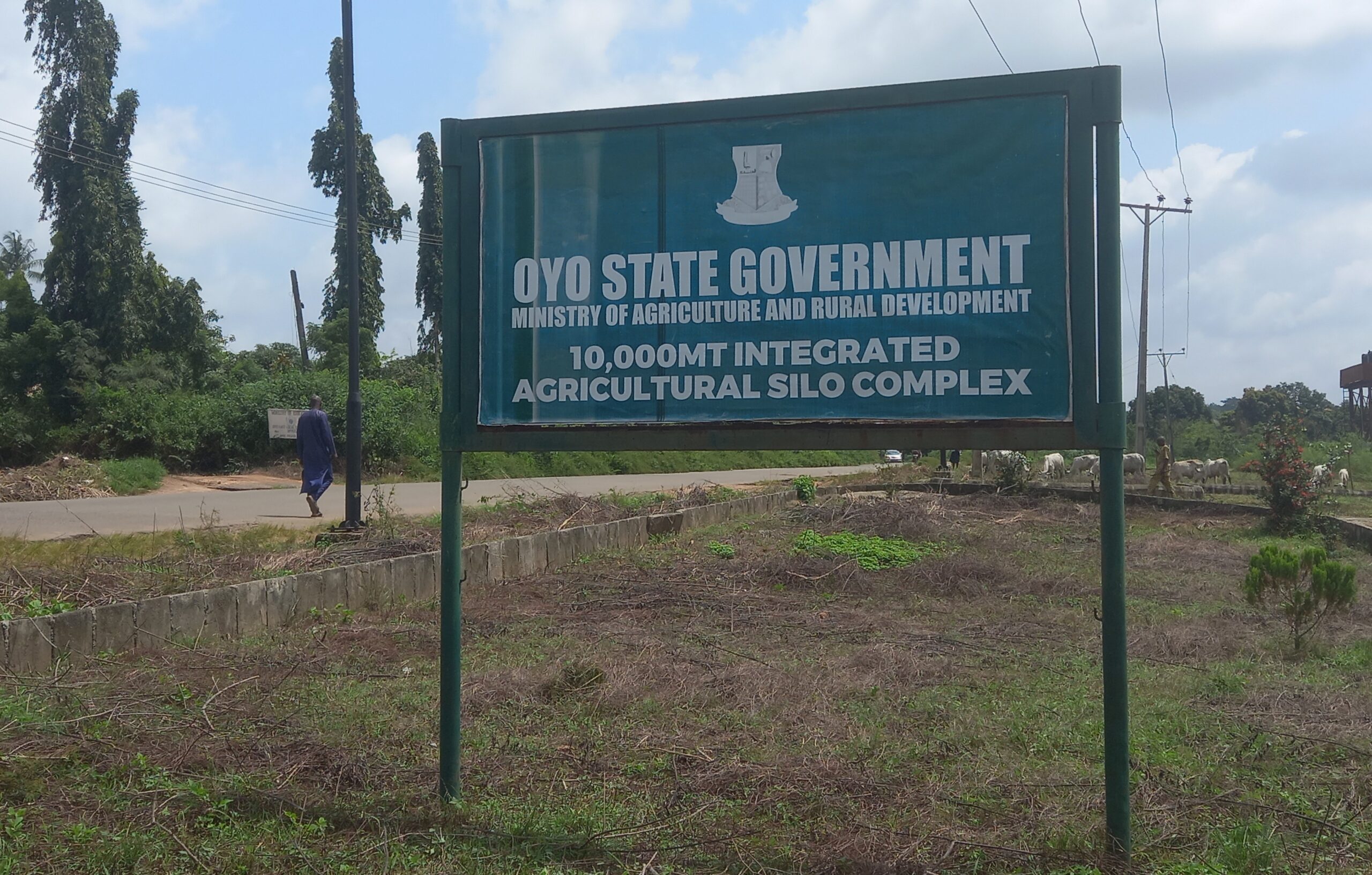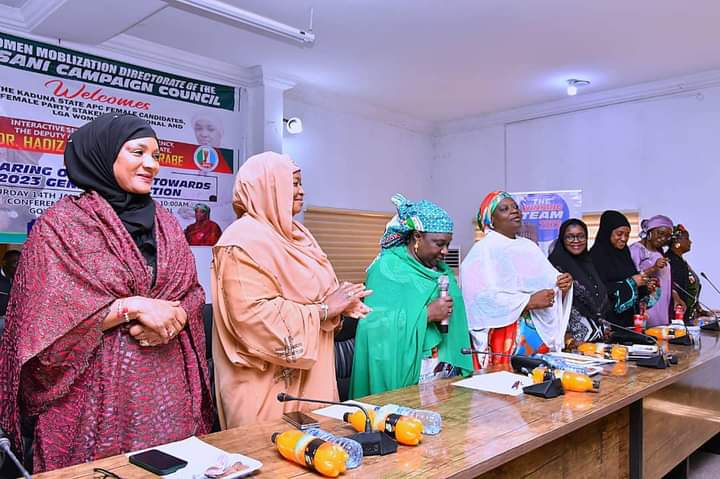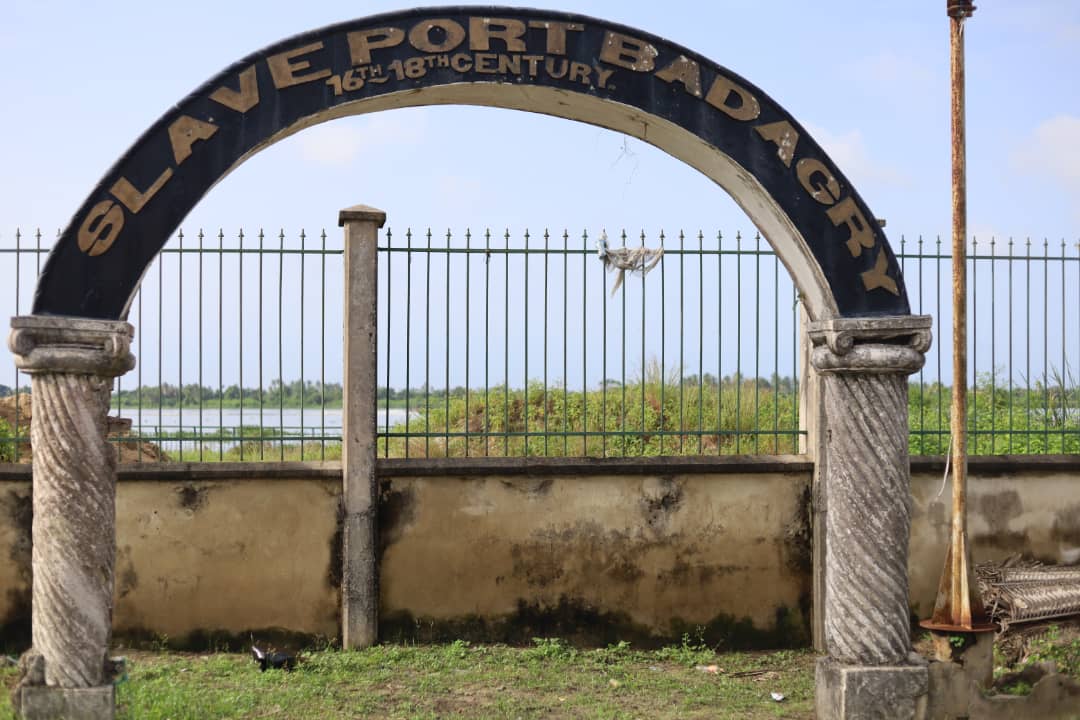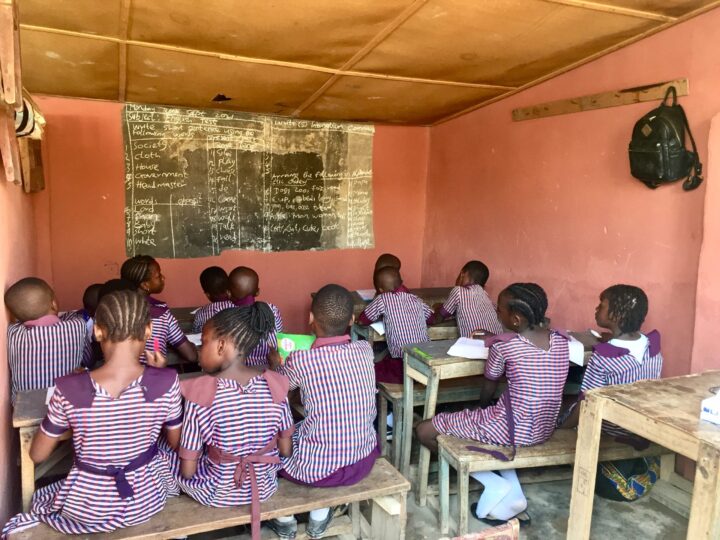BY OLUSOLA OLUDIRAN
In 2013, farmers in Oyo and Awe towns were excited when the Late Abiola Ajimobi, former governor of the state, promised to build a N1.2 billion automated grains silos system for them within six months. The farmers said its provision would enhance farm storage that would greatly reduce post-harvest losses.
A decade after, the expectations of the farmers are yet to be met despite the importance of the project to food security and the advancement of agricultural practices in the state. On a visit to the project’s location along the boundary between Oyo and Awe towns towards Owode market, this reporter observed that the automated silos, proposed to be the largest and the first of its kind in Nigeria, are at the foundation level and practically abandoned.
Advertisement
The reporter, who posed as a researcher, was allowed entry into the fenced project site. A security guard who refused to disclose his name but claimed to be engaged by a security outfit combating oil bunkering said he had been instructed not to allow anyone into the project site except those from the state government.
Inside the facility, the reporter observed that the miniature structure was fully covered by a thick bush which made it difficult to see if there was any foundation laid underneath the bush. Only the administrative block looks less bushy, as other parts have been overwhelmed by huge strands of elephant grasses. However, the security official, who was on the reporter’s close trail, cautioned that any picture snapped from the project site would be forcefully destroyed.
Bunmi Abiola, whose husband is a farmer, owns a stall close to the project site. She lamented the abandonment of the project which could have improved the lives of farmers in the area.
Advertisement
“It is bad that this kind of huge project was abandoned at this crucial moment when food is scarce in Nigeria. When they first started building it and they told us what it is meant for; we were all happy thinking there would be a food surplus. But all they have done is lock it up for years,” she said.
Abiola Jagumolu, a farmer in Oyo town, described the project as a good initiative that could have reshaped the agricultural sector of the state had it been actualised.
“You know that if the project had been implemented, it would be capable of providing over 2000 jobs to our youths because, with about 10,000 metric tons, its potential would enhance agricultural narratives in our state,” Jagumolu said.
The farmer noted that part of the specifications stipulated for the contractor was to build the grains silos as a storage for food crops like rice, beans, guinea corn, maize and others; he added that it was to ensure the project would contain about 10,000 tons of grains to serve as a landmark value chain for agricultural research and fortifications, aside creating up to 50,000 employment opportunities for youths both at the professional and casual levels and as well save the state from food scarcity within the next ten years.
Advertisement
It was gathered that the facility was designed to have an extensive administrative block, including an underground water tank and chemical maintenance centre, meant exclusively for researchers, plus free space for future expansion.
CONTRACT AWARDED, PROJECT NEGLECTED
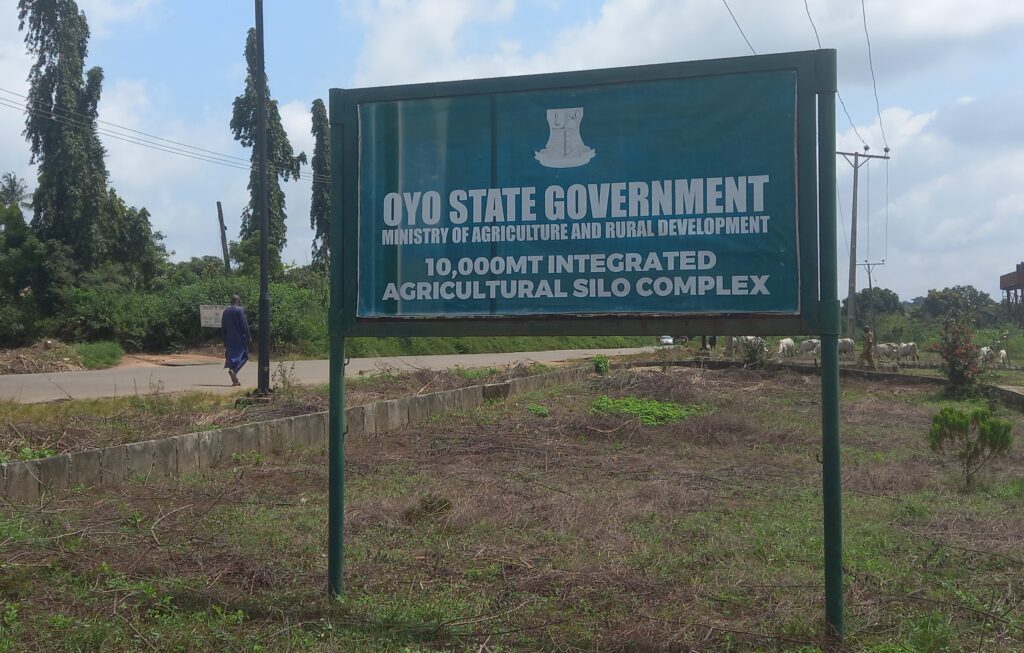
To implement the project, a public announcement was reportedly made by the government asking interested contractors to submit tenders. Consultants were also invited to map out a model for the silos system. Rahvet International Limited, an Ibadan-based contracting firm owned by one Mufutau Raheem, got awarded the project for an undisclosed sum of money under the supervision of the state ministry of agriculture and natural resources. The completion timeline was also moved from six months to one year.
Advertisement
A civil servant in the agriculture ministry, who spoke on the condition of anonymity, said the project’s conceptualisation process had been faulty from the beginning, noting that part of its plans was ambiguous.
“It was as if Ajimobi’s government was not sure if the project could take 10,000 or 25,000 tons of grains. Whereas, it could actually contain more if properly managed,” the official said.
Advertisement
The official recalled that the state used to have grain silos that contained about 7,000 tons of grains built by Obafemi Awolowo, then premier of the old western region,
“I was there when the project was just starting. I saw its plans and projections. I saw the seriousness being put into executing it. So, I feel the Ajimobi-led government was just being modest with its promises,” the official noted.
Advertisement
“From my experience with the old one, I can tell you that if that facility had been completed, it would have easily taken extra 25,000 tons of grains. Actually, I worked at the old silos built by Awolowo and we seamlessly put over 7,000 tons in the storage facility.
“That’s why it is a sad tale that all the funds awarded to the contractor for this project now seem to have gone down the drain as it is already an abandoned project.”
Advertisement
THE LEGAL TUSSLE
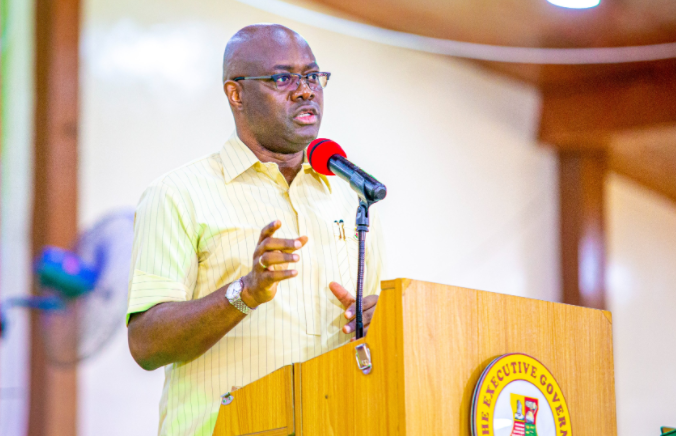
According to the information gathered by this reporter, Ajimobi initially budgeted a sum of N1.2 billion for the silos, out of which 98 percent has reportedly been paid to the contractor. The reporter also gathered from the civil servant that one of the reasons the project was initially left moribund was due to legal disagreements between the state government and the contractor. The government was said to have made attempts to revoke the project, but the contractor took the matter to court. Then, the project became halted.
However, in 2019, Seyi Makinde, the current governor, in his bid to revive the project appealed to the contractor to have an out-of-court settlement. Then, he allotted another N300 million to the project, prompting the contractor to promise completion of the project by January 2020.
Sadly, despite the contractor’s promise, the silos remain uncompleted.
To salvage the project, the Oyo Global Forum (OGF), a socio-political association, said they once engaged the contractor on the way forward.
Ayobami Sanda, OGF chairman, said the group made the contractor sign a memorandum of understanding (MoU) prepared by Wale Adeoye, an Oyo-based lawyer, on September 9, 2021, and witnessed by one Adewole Alabi, an engineer. The contractor committed to completing the project by March 31, 2022, and handing it over to the government; while both parties made the agreement in the interest of the public.
The concluding part of the document clearly states: “…that promisor and his company shall ensure that the test-running is carried out and project delivery effected on or before the 30th day of April 2022.”
Sanda said it is, however, sad that the contractor has made the efforts of the state and the group futile by frustrating residents of the state who need the project to thrive.
“It is unfortunate that the contractor is deliberately making the project impossible to complete despite all we have done to resolve the matter. He has always been evasive even after we used the MoU to force his hands; Oyo state is yet to see its much dreamed-about grain silos,” Sanda lamented.
Speaking on the project on behalf of the traditional ruler of Awe, Akinola Fakanbi, a high chief, condemned its moribund state, noting that it is a disappointment to the residents.
“We all, Awe town residents, are not happy and all we are saying is that the government should show interest in completing the project. If it is working, we have agricultural factories that will benefit from it,” he said.
AN EVASIVE CONTRACTOR
On two occasions, this reporter went to the ministry of agriculture and natural resources at the Oyo state secretariat but was unable to see the commissioner for official talks as his secretary said he was on political trips.
The reporter was directed to the ministry’s permanent secretary, Bode Raji, who talked sparingly about the project. He said: “I’m not authorised to talk about the project; only the contractor is permitted. He should have the full details of what transpired because the legal agitation is still on.”
Meanwhile, every effort by this reporter to get the contractor, Mufutau Raheem, to speak on the project did not yield any fruit. The company’s website where the reporter hoped to get full details had the wrong address which indicated Agbowo Shopping Complex in Ibadan. But when the reporter visited the complex, he found that Agbowo Complex was under construction.
When the reporter finally got through to the contractor on phone, he refused to comment.
“I’m a government contractor; if you have any questions to ask about the project, go to the government,” Raheem said and hung up the phone. When the reporter called again, said he was indisposed and could not speak on the matter.
“I will save your number and call you when I am much better. I need to get discharged from the hospital and then, we can speak about this in detail later,” he said as he promptly hung up the phone.
The state government has reportedly accused the contractor of breaching the project agreement. Speaking with the reporter, Niyi Adebisi, commissioner for agriculture, said the contractor should be blamed for sabotaging the project and must be made to account for the abandonment of the project.
“The contractor did not adhere to the agreement between him and the state. So, the agriculture ministry then reported him to the ministry of justice. Based on the latter’s recommendations, Raheem and his Rahvet Construction Limited have been reported to the Oyo State Anti-Corruption Agency (OYCA).
“If this is not the case, let him come out with his own facts. I resumed as a commissioner a year ago and met this situation; but based on my findings and the information made available, I have given you what you need.”
Asked about the procurement process, the commissioner said he would not speak on that owing to the court cases on the ground.
“When a matter is in court, we have to be very careful, plus the fact that the whole issue has been transferred to OYCA as I told you. So, we have to say less,” the commissioner retorted.
This report is funded with the support of McArthur Foundation and the International Centre for Investigative Reporting (ICIR).
Add a comment
